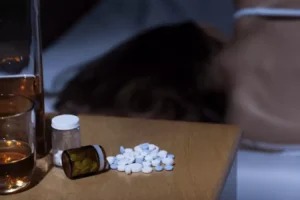
This happens every time or frequently enough that drinking seems to become out of control and raises questions. Although they may appear to be healthy and functional, without treatment, their condition could get worse. A test recommended by the National Institute for Health and Care Excellence (NICE) is the alcohol use disorders identification test (AUDIT).

I’m In Recovery
The first step for most people is detox, which means quitting alcohol. A detox may take place at a hospital or inpatient facility, such as rehab. The NIAAA offers a range of assessment tools and strategies to help people understand their drinking patterns, reduce their drinking, or quit completely. ” self-assessment below if you think you or someone you love might be struggling with an alcohol use disorder (AUD). The evaluation consists of 11 yes or no questions that are intended to be used as an informational tool to assess the severity and probability of an AUD. The test is free, confidential, and no personal information is needed to receive the result.
- However, early intervention is crucial to preventing further harm and promoting recovery.
- Our online health insurance verification system will estimate your in-network and out-of-network deductibles, coinsurance percentages and out-of-pocket maximums.
- After all, they have managed to maintain the appearance of success despite their addiction.
- The consequences of alcohol use aren’t as severe in someone with functioning alcoholism, at least not at the moment.
- Understanding these risks is crucial for recognizing the severity of the disorder and seeking appropriate help.
- Just because someone with an alcohol use disorder (the medical term for an alcoholic) is functioning doesn’t mean they’re functioning well or functioning in each aspect of their lives.
Frequent Performance Issues at Work or Other Functions

This type of reckless behavior isn’t part of the image they’ve worked so hard to create, and in turn, they work harder to avoid mistakes in the future. It’s not uncommon to see high-functioning alcoholics replace meals with a few drinks. They tend to lose all interest in food, and instead, use mealtime as an excuse to start drinking again. Just because someone is high-functioning doesn’t mean they’re not at risk of hurting themselves or others as a result of their drinking. It’s important to treat high-functioning alcoholics just like all other addicts by helping them realize the severity of their addiction and encouraging them to seek Sobriety treatment.
Addiction Treatment

Consider having an open and honest discussion with your loved one about their alcohol use and encourage them to discuss it with a counselor or their primary care doctor. Unfortunately, even when functional alcoholics begin to recognize that they have a high functioning alcoholic drinking problem, they still resist reaching out for help. By the time they admit the problem, their withdrawal symptoms—which can begin within a few hours after their last drink—can become more and more severe. There are many rehab centers and support groups, both online and in-person, for people who are working to achieve sobriety.
Sustained Recovery
If you’re unsure where to begin, a primary care provider can be a good resource in the earliest stages of diagnosing an alcohol use disorder. Perhaps the most difficult component of managing a high-functioning alcoholic is their belief that there isn’t a problem. They’re doing fine at work, school and home, so they believe they’re controlling their drinking. Some may even believe a couple of drinks a day is necessary to manage stress.
- Consider speaking to your primary care provider about your concerns or attending a support group as a first step.
- Despite saying they’re going to have “just one drink,” high-functioning alcoholics are unable to limit their alcohol consumption.
- Despite the desire to quit drinking, many people will refuse treatment or help.
- Many alcoholics succeed at work and in school and have great relationships.
- As their reliance on alcohol increases, you may begin to notice that your loved one downplays the role alcohol has in their lives and makes excuses for their actions, especially their drinking.
Any treatment center receiving calls from the site is a paid advertiser. Calls to numbers on a specific treatment center listing will be routed to that treatment center. Calls to any general helpline will be received by Pinnacle Health Group or Still Behavioral Health Group, both of whom are paid advertisers.

An alcohol use disorder, as defined by the Diagnostic and Statistical Manual of Mental =https://ecosoberhouse.com/ Disorders or DSM-5, is a problematic pattern of behaviors related to alcohol use. When you have an alcohol use disorder, it causes impairment and distress. There’s a spectrum for diagnosis, including mild, moderate or severe.




